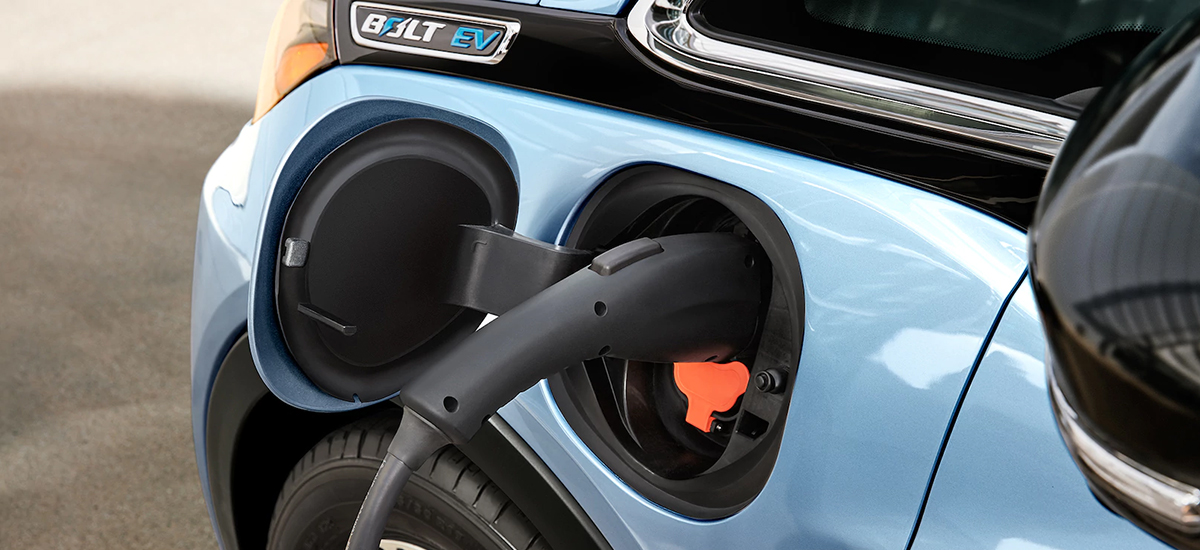
 Your Credit Estimate
Your Credit Estimate
 Your Credit
Your Credit
Your zip code helps us provide you with the most accurate vehicle pricing and vehicle availability.
We estimate your credit score to give you an idea of your monthly payments. To get an accurate payment amount, complete our credit application by clicking the Start Credit Application button below.
start credit application
The 2018 Chevrolet Bolt EV came out in 2017, and the U.S. wasn’t as ready for it as it could have been. Not only does it give the new Tesla a run for its money, some people even say the Chevrolet Bolt EV is better than a Tesla. Electric car lovers do hit a bit of a snag though. The auto industry has yet to make owning an alternative fuel vehicle as practical as a gas or diesel vehicle, and keeping a plug-in hybrid (PHEV) or even an electric vehicle (EV) charged can sometimes be a challenge since charging stations have not taken over every corner - yet.
There are many benefits that come with owning an alternative fuel vehicle like a PHEV or EV over an internal combustion engine (ICE) vehicle (before reading more, here’s a quick review on hybrid and electric terms if you need it). For one, consumers save money at the pump due to fewer fill ups (or none if an EV), and recharging a battery only costs a few dollars. Second, PHEVs and EVs qualify for a federal tax credit come tax season, and that can be up to $7,500 so that’s a nice financial incentive. Third, maintaining an electric vehicle is more affordable than maintaining an ICE. All of those benefits bring us to the 2018 Chevrolet Bolt EV.
The Chevrolet Bolt EV was introduced in 2017, and it’s a magnificent vehicle that is making a name for itself. One can drive up to 238 miles with a fully charged battery in the Chevy Bolt EV, and some drivers say they can travel as far as 250+ miles. The Chevrolet Bolt EV also makes up the testing fleet for Chevrolet autonomous technology. In addition to its fuel economy, the Chevy Bolt EV also has a DC fast charging capability that recharges the battery enough to go 90 miles in thirty minutes. When it comes to ratings and awards, the Bolt EV was named an IIHS Top Safety Pick, and it was named Motor Trend’s Car of the Year the first year it was introduced.
Though the Bolt EV is an excellent vehicle, one reason many people didn’t invest in a new EV like the Chevy Bolt EV last year is because the auto industry is dragging its feet when it comes to making alternative fuel vehicles practical. Finding a charging station can be a bit of a headache with membership fees, finding one close to your destination, or even finding one that’s available sometimes.
However, one automaker is dominating more than others and that is Tesla because they dedicate funding into creating charging stations, and that gives them an advantage. Tesla makes it easy to see where chargers are en route. What about other automakers?
Chevrolet, Kia, Mitsubishi, Ford, Nissan, Chrysler, Alfa Romeo, Hyundai, to name a few, all have an alternative fuel lineup and at least one PHEV or EV, so it’s not like PHEVs and EVs are a niche in the auto industry anymore. Why aren’t there charging station notifications? Where is the app for that? There’s PlugShare for a free map, and ChargePoint if a member, but it could and should be way easier. If looking to compete in the alternative fuel industry, then more automakers will need to dedicate time and money on making charging up less problematic.
Good thing is, charging stations are popping up like crazy in Florida’s metro areas like Jacksonville, Orlando, Tampa/St. Pete, and South Florida and they’re not all dedicated to Tesla. Give it a few years, and charging stations may be on every corner versus the typical self-service gas station. What do you think about that? Let us know on the NowCar Facebook page. And if you’re still iffy, check out these fuel-efficient cars for 2018.